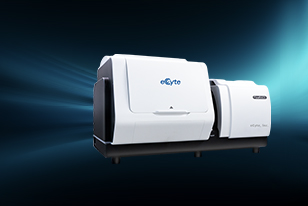How can we swiftly and accurately select target single cells during the testing of a cell mutant library? How do we identify unique, functional, low-abundance cells from a vast population? When faced with the immense task of single-cell clone selection, how can we optimize resources, reduce the consumption of experimental materials, and eliminate the need for piles of Petri dishes?
These challenges are now addressed with the release of eCyte, Inc.'s (eCyte) latest innovation—the Digital Colony Picker (DCP). Recently unveiled at the 15th Globe Industrial Microbiology Congress & Metabolic Engineering Summit 2024 (GIM & MES 2024), eCyte’s DCP enables large-scale, parallelized physical separation of target single cells with specific functions from a genetically heterogeneous cell population. It supports microdroplet-based cultivation, phenotypic monitoring of each microdroplet during the cultivation process, and fully automated selection of droplets containing pure cultures that exhibit desired phenotypes. This instrument can be widely applied to parallelized cultivation of various cell types, as well as the intelligent, automated selection of desired clones.
Four-in-One, Breaking the “Stereotypes” of Clone Selection
eCyte's DCP integrates multiple cutting-edge technologies, including static droplet array cultivation, AI-assisted image processing, and non-contact optical manipulation of microdroplets. These technological innovations enable the simultaneous parallelled cultivation of tens of thousands of independent microchambers on a single chip, bright-field imaging for cellular growth and multiplication, fluorescence imaging (when necessary), A.I. based selection of targeted clones and their individualized non-contact exportation, all at single-cell resolution and for each of the selected microchambers.
DCP consolidates the functions of four different instruments—plate spreaders, growth monitors (for culturing), microplate readers (for fluorescence detection), and plate clone pickers—into one. Additionally, using "optical manipulation technology," DCP achieves non-contact, high-precision single-cell selection, reducing operational complexity and contamination risks. This breakthrough overcomes the limitations of traditional clone selection methods, marking a new era in single-cell clone selection technology and providing researchers with a more efficient and intelligent tool.
Six Core Advantages Address Industry Pain Points
DCP offers six key advantages, delivering a completely different experimental experience for researchers.
Cost Reduction and Efficiency, Balancing Productivity and Cost Control
In research, how can we achieve more results with fewer resources? eCyte’s DCP significantly reduces the cost and time associated with traditional screening methods through its innovative technology, offering researchers a high-efficiency pathway to cost reduction and performance enhancement.
For instance, to screen 5,000 E. coli clones, traditional methods would require at least 50 Petri dishes, 50 disposable spreaders, 5,000 pipette tips, and 1,000 mL of culture medium. In contrast, the DCP only requires one microfluidic chip, one pipette tip, and 0.02 mL of culture medium to accomplish the same screening task. Furthermore, the DCP shortens the screening process, which traditionally takes over ten hours, to just 4-5 hours. As the screening scale expands, the DCP’s advantages over traditional methods increase exponentially due to its highly scalable chip design.
Real-World Applications Demonstrate Outstanding Performance
The exceptional performance of the DCP is making it a versatile tool in scientific research, applicable to various cell types and playing a significant role across multiple fields.
In the field of synthetic biology, the DCP helps researchers identify high-lactate-producing strains using fluorescence signals, resulting in a 17.6% increase compared to the original strain. Moreover, through colony size analysis under bright-field imaging, the DCP successfully discovered fast-growing strains with growth rates 69.6% higher than the original strain.
In environmental microbiology, the DCP uses the abundant information on cell growth and reproduction under bright-field imaging as indicators for clone selection, efficiently identifying and avoiding redundant cells, significantly improving the efficiency and targeting of microbiome studies. The DCP also excels in screening low-abundance strains, reducing culturing time by two-thirds compared to traditional solid plate methods. Furthermore, since many microorganisms in nature thrive better in fully liquid environments, the DCP often identifies more genetically diverse single clones under the same culturing conditions compared to agar plates.
The advent of the DCP marks a new era in single-cell clone selection technology. With its "four-in-one" functionality, "six core advantages," and cost-efficiency, the DCP is making a strong entry into both scientific and industrial fields, providing researchers with a more efficient and intelligent experimental platform. By significantly reducing experimental costs and increasing efficiency, we look forward to the DCP being applied in even more research fields, where it is expected to bring innovative discoveries to the life sciences.






